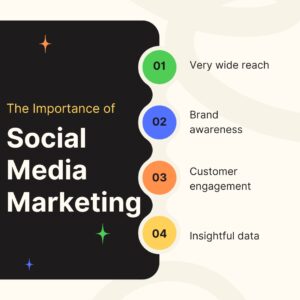Social media marketing has become necessary in today’s business world for any business to become successful. With millions of users across multiple social media platforms, businesses now have the remarkable opportunity to engage consumers meaningfully. This guide will illustrate the nature of social media marketing, its relevance, successful strategies, and best practices.
The Importance of Social Media Marketing
There are several reasons why social media marketing is significant:
- Very Wide Reach: Platforms such as Facebook, Instagram, Twitter, and LinkedIn allow businesses to reach a global audience. Statista states that in the year 2025 there will be more than 4.9 billion social media active users in the world.
- Brand Awareness: Frequent interaction with users in social media enhances visibility and recognition of brands. Businesses are able to maintain a strong online presence that resonates with their target audience.
- Customer Engagement: Social media encourages direct interaction between brands and consumers. Engaging content invites likes, shares, comments, and deliberations that build a community around a brand.
- Insightful Data: Social media platforms provide an analytics toolkit that helps businesses monitor engagement metrics while gaining a better perspective on consumer behavior.
Basic Strategies for Successful Social Media Marketing
Social media marketing can be super effective if the following strategies are incorporated:
- Set Your Objectives
Before venturing into the world of social media marketing, it is important to set objectives. Common goals include brand awareness, leads, traffic to your website, and customer care.
- Finding Their Way to You
Target audiences are barriers to relevant content development that speaks to them. Use surveys or analytics data to learn about preferences and behaviors of your audience.
- Right Platforms Matter(H3)
Not all social networks are good for every business. Find out the platform that fits your ideal customer well, and use it there. For instance:
- Facebook is ideal for reaching a broad audience.
- Visually-driven brands are Instagram’s forte.
- B2B companies use LinkedIn to reach professionals.
- Good Content is Engaging Content
Content is the key factor in social media marketing success. Create interesting graphics such as images/video, articles/blogs, infographics, and interactive posts such as polls/quizzes that get the audience to interact.
- Be Consistent
Keep up the posting frequency so that over time your audience gets engaged. You can use a content calendar to prepare for the next posts and maintain regular content flow across your platforms.

- Analysis Is Important(H3)
Analyze your efforts regularly with the help of built-in analysis tools in each platform or with the help of third-party applications, such as Hootsuite or Buffer. Metrics to measure should include engagement (likes, shares, comments), growth of followers, CTR, conversion rate, etc. These findings will assist in pointing you in the direction of the best-performing content.
FAQ :
1.What is social media marketing?
Social media marketing (SMM) is a type of digital marketing that enables companies to market their products or services using social networking websites and mobile applications.
2.How does social media differ from traditional advertising techniques?
Social media provides marketers a way to connect directly with consumers through online communities, unlike traditional advertising methods such as printed materials, radio, and television.
- Can social media marketing really help my business?
Yes, social media marketing can significantly benefit your business. In fact, more than half of internet users (56%) purchase a product online each week.
- What are the benefits of social media marketing for my company?
The benefits include increased visibility, targeted traffic based on demographics and interests, improved SEO rankings due to search engines favoring social media results, enhanced customer service opportunities through direct communication with customers, increased brand awareness through positive word-of-mouth advertising, and building customer loyalty as satisfied customers recommend your brand to others.